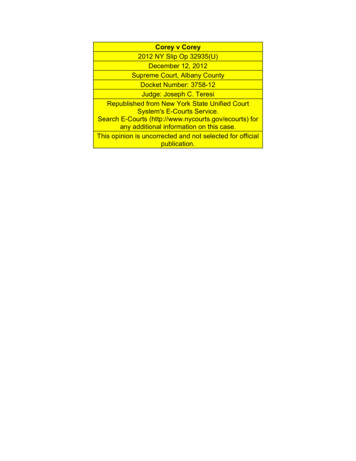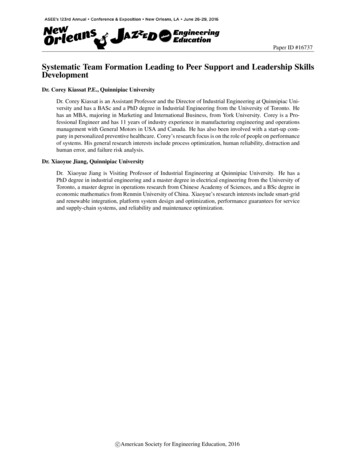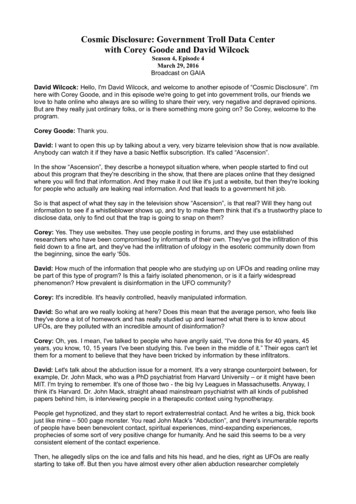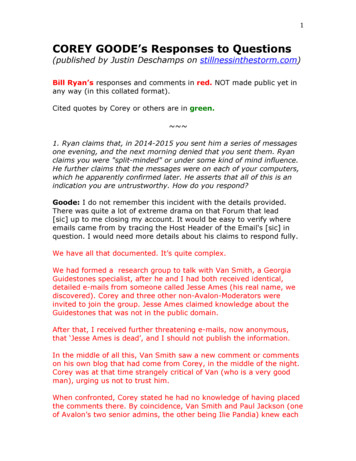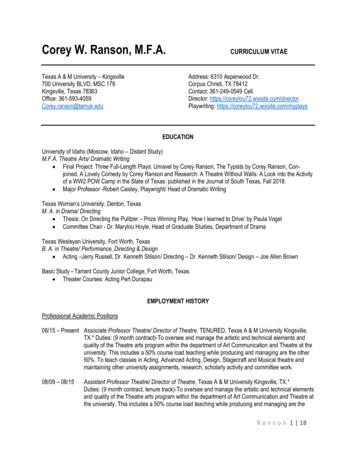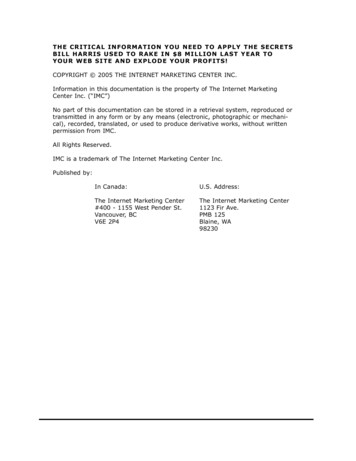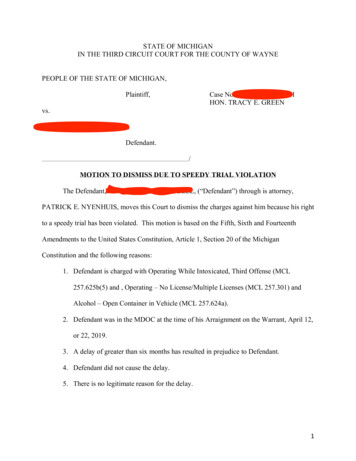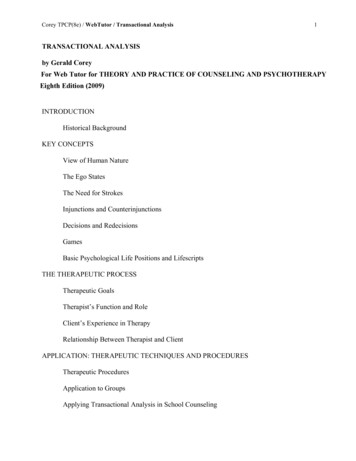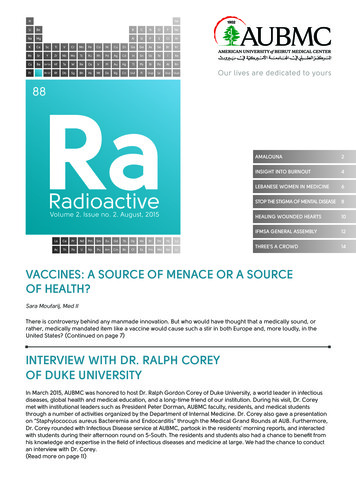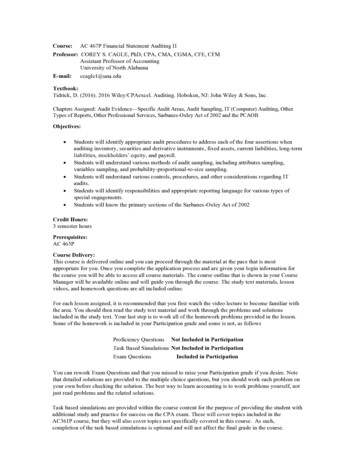
Transcription
Course:AC 467P Financial Statement Auditing IIProfessor: COREY S. CAGLE, PhD, CPA, CMA, CGMA, CFE, CFMAssistant Professor of AccountingUniversity of North AlabamaE-mail:ccagle1@una.eduTextbook:Tidrick, D. (2016). 2016 Wiley/CPAexcel. Auditing. Hoboken, NJ: John Wiley & Sons, Inc.Chapters Assigned: Audit Evidence—Specific Audit Areas, Audit Sampling, IT (Computer) Auditing, OtherTypes of Reports, Other Professional Services, Sarbanes-Oxley Act of 2002 and the PCAOBObjectives:Students will identify appropriate audit procedures to address each of the four assertions whenauditing inventory, securities and derivative instruments, fixed assets, current liabilities, long-termliabilities, stockholders’ equity, and payroll.Students will understand various methods of audit sampling, including attributes sampling,variables sampling, and probability-proportional-to-size sampling.Students will understand various controls, procedures, and other considerations regarding ITaudits.Students will identify responsibilities and appropriate reporting language for various types ofspecial engagements.Students will know the primary sections of the Sarbanes-Oxley Act of 2002Credit Hours:3 semester hoursPrerequisites:AC 463PCourse Delivery:This course is delivered online and you can proceed through the material at the pace that is mostappropriate for you. Once you complete the application process and are given your login information forthe course you will be able to access all course materials. The course outline that is shown in your CourseManager will be available online and will guide you through the course. The study text materials, lessonvideos, and homework questions are all included online.For each lesson assigned, it is recommended that you first watch the video lecture to become familiar withthe area. You should then read the study text material and work through the problems and solutionsincluded in the study text. Your last step is to work all of the homework problems provided in the lesson.Some of the homework is included in your Participation grade and some is not, as followsProficiency QuestionsNot Included in ParticipationTask Based Simulations Not Included in ParticipationExam QuestionsIncluded in ParticipationYou can rework Exam Questions and that you missed to raise your Participation grade if you desire. Notethat detailed solutions are provided to the multiple choice questions, but you should work each problem onyour own before checking the solution. The best way to learn accounting is to work problems yourself, notjust read problems and the related solutions.Task based simulations are provided within the course content for the purpose of providing the student withadditional study and practice for success on the CPA exam. These will cover topics included in theAC361P course, but they will also cover topics not specifically covered in this course. As such,completion of the task based simulations is optional and will not affect the final grade in the course.
Quizzes and exams should be taken at the time shown in your lesson outline. Note that quizzes and examsdo have time limits. Quizzes and exams can be taken only once. If you have any questions as you completethe course please email me.Course Access and Enrollment Issues:1.2.3.Once your application has been processed and you are officially admitted as a student at UNA andenrolled in this course, you will receive an email from the professor welcoming you to the course.The University of North Alabama allows students two semesters to complete the requirements for aspecific course, subject to the approval of the instructor. If you do not complete the course in thesemester of your initial enrollment, you will receive a grade of “Incomplete” and will be able tocomplete the course in the following semester. If you do not complete the course by the end of thesecond semester of enrollment, then you automatically receive a failing grade for the course.The content covered in this course is very similar to the content covered in the face -to-face coursesoffered at UNA. If you plan to pursue the CPA license, we advise you to be familiar with therequirements for the state where you plan to sit for the CPA exam to insure that the courses youcomplete are appropriate. These requirements can vary substantially across states (seewww.nasba.org for a listing of State Boards of Accountancy websites).Course Assessments and Final Grade:The following are the general policies for this class. Deviations may be necessary.1.2.3.4.5.There will be four exams and eight quizzes.All exams and quizzes will be given on-line and will focus on problem-solving skills. Studentswill be allowed no more than 75 minutes for each exam and no more than 20 minutes for eachquiz.All exams and quizzes will be open book and notes, but each student must complete the testswithout assistance from other individuals.DO NOT CHEAT ON EXAMS OR QUIZZES. Anyone who cheats will receive an F for thecourse.Final grades are determined as follows:PointsHomework55EXAM 1100EXAM 2100EXAM 3100EXAM 41008 Quizzes@ 20 each160
Grades will be assigned as follows:90% or above A80% to 90% B70% to 80% C60% to 70% DBelow 60% FYour grade will be the percentage of your total points earned to 530 points.Topics Covered:Auditing & AttestationAudit Evidence—Specific Audit AreasIntroduction to Auditing Individual AreasCashAccounts ReceivableInventoryInvestments in Securities and Derivative InstrumentsFixed AssetsCurrent LiabilitiesLong-Term LiabilitiesStockholders' EquityPayrollAudit SamplingIntroduction to SamplingAttributes SamplingVariables SamplingProbability-Proportional-to-Size (PPS) SamplingIT (Computer) AuditingIT Controls—General ControlsIT Controls—Application ControlsIT Evidence-Gathering ProceduresOther IT ConsiderationsOther Types of ReportsReports on Application of Requirements of FrameworkF/S with Special Purpose FrameworksAudits of Single F/S and Specific Elements, Accounts, or ItemsReporting on Compliance with Requirements in a F/S AuditService Organizations—User AuditorsService Organizations—Service AuditorsComfort LettersGovernment Auditing StandardsCompliance AuditsSSARSs—General PrinciplesSSARSs—Preparation of Financial StatementsSSARSs—Compilation EngagementsSSARSs—Review EngagementsSSARSs—Other TopicsOther Professional ServicesAttestation StandardsFinancial Forecasts and ProjectionsPro Forma Financial InformationCompliance AttestationReporting on Internal Control in an Integrated Audit
Management's Discussion and Analysis (MD&A)Assurance ServicesSarbanes-Oxley Act of 2002 and the PCAOBPCAOB ResponsibilitiesAuditing Standard No. 1Auditing Standard No. 3Auditing Standard No. 4Auditing Standard No. 5Auditing Standard No. 6Auditing Standard No. 7Auditing Standard 8-15Auditing Standard No. 16Auditing Standard No. 17Auditing Standard No. 18ACADEMIC HONESTY—UNIVERSITY POLICY:Students are expected to be honorable and observe standards of conduct appropriate to a community of scholars.Additionally, students are expected to behave in an ethical manner. Individuals who disregard the core values oftruth and honesty bring disrespect to themselves and the University. A university community that allows academicdishonesty will suffer harm to the reputation of students, faculty and graduates. It is in the best interest of the entireuniversity community to sanction any individual who chooses not to accept the principles of academic honesty bycommitting acts such as cheating, plagiarism, or misrepresentation. Offenses are reported to the Vice President forAcademic Affairs and Provost for referral to the University Student Discipline System for disposition (see“Academic Honesty” in the Academic Procedures and Requirements section of the University Catalog for moreinformation).STUDENTS WITH DISABILITIES—UNIVERSITY POLICY:In accordance with the Americans with Disabilities Act (ADA) and Section 504 of the Rehabilitation Act of 1973,the University offers reasonable accommodations to students with eligible documented learning, physical and/orpsychological disabilities. Under Title II of the Americans with Disabilities Act (ADA) of 1990, Section 504 of theRehabilitation Act of 1973, and the Americans with Disabilities Amendment Act of 2008, a disability is defined asa physical or mental impairment that substantially limits one or more major life activities as compared to anaverage person in the population. It is the responsibility of the student to contact Disability Support Services toinitiate the process to develop an accommodation plan. This accommodation plan will not be applied retroactively.Appropriate, reasonable accommodations will be made to allow each student to meet course requirements, but nofundamental or substantial alteration of academic standards will be made. Students needing assistance shouldcontact Disability Support Services. Complete guidelines and requirements for documentation can be found on theDSS web pages at http://www.una.edu/disability-support.INFORMATION TECHNOLOGY ACCEPTABLE USE—UNIVERSITY POLICYThis acceptable use statement governs the use of computers, networks, and other information technologies at theUniversity of North Alabama. This statement applies to all students and employees of the University, and to allother persons who may legally or illegally use or attempt to use a computer resource owned by the University,and/or is connected by any means to the campus computing network. As a user of these resources, you areresponsible for reading and understanding this document. To view the entire Information Technologies AcceptableUse Statement, please see http://www.una.edu/its/una-it-policy.html.TITLE IX—UNIVERSITY POLICYThe University of North Alabama has an expectation of mutual respect. Students, staff, administrators, and facultyare entitled to a working environment and educational environment free of discriminatory harassment. Thisincludes sexual violence, sexual harassment, domestic and intimate partner violence, stalking, gender-baseddiscrimination, discrimination against pregnant and parenting students, and gender-based bullying and hazing.Faculty and staff are required by federal law to report any observation of harassment (including online harassment)as well as any notice given by students or colleagues of any of the behaviors noted above. Retaliation against anyperson who reports discrimination or harassment is also prohibited. UNA’s policies and regulations coveringdiscrimination and harassment may be accessed at https://www.una.edu/titleix/. If you have experienced orobserved discrimination or harassment, confidential reporting resources can be found on the website or you maymake a formal complaint by contacting the Title IX Coordinator at 256-765-4223.
COMMUNICATION EXPECTATIONS—COLLEGE OF BUSINESS POLICYCommunication Methods Anytime you communicate with your professor, please allow up to 48 hours for a reply. Correspondencereceived on Fridays and university holidays may not be addressed until the next regularly scheduledbusiness day at UNA.You may also call or drop by the office during regularly scheduled office hours. If these times do notwork for you, please contact me for an appointment.
2. All exams and quizzes will be given on-line and will focus on problem-solving skills. Students will be allowed no more than 75 minutes for each exam and no more than 20 minutes for each quiz. 3. All exams and quizzes will be open book and notes, but each student must complete the tests without assistance from other individuals. 4.
